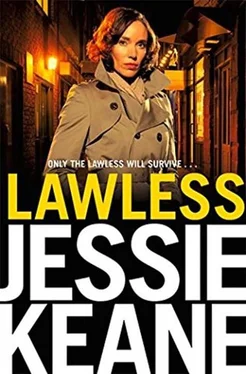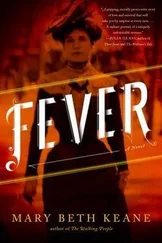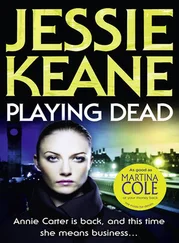‘Thank you for coming,’ she said to him.
Fabio had to admit that Maria was a nice-looking girl, although obviously cowed from her marriage to Vittore. He wondered about that, how it was with the two of them. Despite Mama’s objections to the union, the marriage seemed to have stuck. There were no children, true, but she seemed to be a devoted wife.
But now, this. A secret meeting! He was intrigued.
‘Hi, Maria,’ he said, and sat down with her on a bench. ‘What’s all this about then?’
Maria stared at his face. Then, unsmiling, she indicated her own. ‘It’s about this, Fab.’
Fab peered at her cheek. Beneath the film of make-up, it looked faintly blue.
‘What? That bruise there? You fell against the fireplace, you said.’
‘I know. I lied.’
Fabio frowned. ‘How did it happen, then?’
Maria gulped down a breath. ‘Vito hit me. He hits me all the time.’
‘He what ?’ This was the first Fabio had heard about it.
She nodded. ‘It’s true.’
Fabio was silent.
‘I asked Tito to have a word with him. He wouldn’t.’
Fabio shrugged. ‘Maybe you should tell Mama. She has more say with Vittore than anyone.’
‘Mama Bella hates me. She always has. Do you think I don’t know that?’ Maria sniffed. ‘I think you’re a bigger man than your brother, Fabio. I think you could speak to Vittore for me, warn him off.’
Fabio looked at her. He was flattered that she was confiding in him, but this wasn’t his business. If he dared speak to Vittore about it, Vittore would be livid. He had no intention of provoking his brother, knowing what he was like when he flew into one of his rages. Still, she had come to him; of course she had. He was getting to be a big man now, a businessman in his own right, and clearly she respected him enough to entrust him with this.
‘I’ll see what I can do,’ he said. He’d do nothing.
‘You will?’ Maria smiled. She was really quite pretty, he thought.
She reached out, put a small hand on his thigh. ‘You’re so nice,’ she said, smiling into his eyes.
Things were really looking up.
Naples, 1947
Astorre’s opportunity had come at last. Patience had triumphed. The baker Lattarullo was heard in his shop moaning about how when he took fresh bread into Corvetto’s compound every day, Corvetto always insisted on coming down to the kitchens and prodding the produce, asking, Is it stale? Are you bringing me yesterday’s bread, not fresh like I ordered?
‘The man’s a pig,’ said Lattarullo to anyone who would listen. ‘He insults me.’
Bella, who’d been in the shop buying what little bread she could afford, went home and reported this to Astorre.
Astorre knew that Lattarullo was a decent, hard-working man. He was also the widowed father of a beautiful daughter, whom he adored.
It pained Astorre to do it. But he knew he had to, to avenge his dead father Franco’s soul. Here Tito played his part, spiriting the girl Luisa away to an isolated place, a little falling-down hut near the family’s home, and kept her there.
Meanwhile, Astorre called upon the baker Lattarullo and told him that unless he performed a certain task on Astorre’s behalf, his daughter would be killed.
The man started gabbling away, begging for his daughter’s safe return.
‘That is guaranteed,’ said Astorre, making calming motions with his hands. The poor bastard was doomed, he just didn’t know it yet. ‘All will be well, I promise you. But first you have to do something for me.’
Lattarullo passed a desperate night in his bakery, Astorre standing at his side. The baker worked, kneading the dough, flour misting the air. All the time he prayed for his child to be returned to him unharmed.
‘She’ll be fine,’ said Astorre. ‘So long as you do this for me.’
In the morning, as usual, Lattarullo drove out to the Corvetto compound in his truck, the covered section at the back piled high with bread for all the estate workers. The guards let him in, holding the snarling dogs tight on their leashes.
‘Go on up,’ said one, grinning and grabbing a loaf out from under the cover, pulling it apart, eating. Then he paused. ‘Hold on,’ he said, and he went around the back of the truck and poked hard at the covers. Then again and again, each poke more vicious than the last.
Lattarullo’s heart was in his mouth.
‘You’ll damage the goods,’ he warned, his voice trembling, sweat pouring down his brow as the day’s heat intensified.
The guard drew back with a grin. ‘Go on. Up you go.’
Lattarullo drove up to the house, parked in his usual spot outside the kitchen door. He switched off the engine with a shaking hand, took his basket and threw back the cover at the rear of the truck. He piled bread into the basket, his eyes furtive as they moved left and right. Another guard holding a rifle lingered by the door, watching him.
‘All right, my friend? Hot day, uh?’ he asked.
‘Yes,’ said Lattarullo unsteadily.
He took the basket filled with bread into the kitchen. There was the cook, smiling a welcome, her fat black lapdog at her feet as usual. The dog got up at Lattarullo’s entrance and hobbled bow-legged toward him.
And here came Corvetto, bustling in from the hall, slapping the baker on the shoulder, taking up a loaf from the basket. Lattarullo felt so terrified now, so overwhelmed at what was required of him, that he thought he might faint.
‘These are fresh today, huh?’ Corvetto asked, his gaze teasing and offensive to a craftsman such as Lattarullo. Of course the bread was fresh. It was the finest in Napoli.
‘Yes, fresh,’ said Lattarullo. His mind was full of Luisa, his beautiful girl; he was doing this for her.
Corvetto tore a hunk from the loaf and popped it into his grinning mouth. He chewed thoughtfully. Then he coughed. The cook poured water from the carafe and pushed it towards him, on the kitchen table. Corvetto coughed again, swigged some of the water.
‘Are you-’ started the cook, but she didn’t finish the sentence.
Lattarullo drew the knife out of his pocket. He’d honed it last night, for just this purpose.
My lovely Luisa, he thought. After he did this, he would be dead, but she would be safe at least. He had Astorre’s word on that.
With a desperate shriek, he drove the knife in an upstroke into Corvetto’s fat neck. Lattarullo had strong hands from his work in the bakery, and he used that strength now to pull the blade across. Blood spurted out in an arterial jet from the rapidly opening wound and Corvetto fell back, his mouth gaping wide, the remnants of Lattarullo’s bread falling out of it. Blood poured from his mouth and drenched his clothes. Lattarullo was spattered in blood, so was the cook and her dog, the walls, the table, the ceiling.
The cook screamed. The dog started barking, a high panicky sound. Corvetto fell to the floor, gasping uselessly, his windpipe sliced in two, his eyes wide open in terror. He could see his own life ebbing away as the blood pulsed out of his throat. His hands pawed at the wound, as if he could stop the flow; he couldn’t. The cook said afterwards that you could see in his eyes that he knew it.
The guard ran in from outside the kitchen door, alerted by the woman’s screams and the dog’s wild barking. He saw Lattarullo standing there with the bloodied knife in his hand.
Luisa, thought Lattarullo.
Читать дальше












